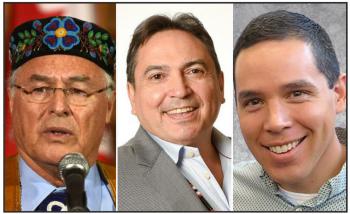Image Caption
Summary
Local Journalism Initiative Reporter
Windspeaker.com
A five-day virtual symposium on Indigenous languages hosted by Canadian Heritage kicked off on Jan. 25, the same day applications for the positions of Indigenous languages commissioner and three directors closed.
The symposium, the Office of the Indigenous Languages Commissioner, and the Indigenous Languages Act (Bill C-91) proclaimed in June 2019 underscore that an “urgent agenda for action” is being set, said Métis National Council President Clement Chartier.
The Michif language is “critically endangered,” he said, with a generous estimate of having 1,000 fluent Michif speakers still living.
Assembly of First Nations National Chief Perry Bellegarde and Inuit Tapiriit Kanatami President Natan Obed echoed Chartier about the dire need for strong and immediate action to be taken to revitalize Indigenous languages.
However, Obed went a step further, continuing to advocate for what he was unsuccessful in getting when the Indigenous Languages Act was being developed: Inuktut given official language status within the Inuit homeland of Nunangat.
“We have rights to use our language, to access education and health care and government services in our language,” said Obed.
The figures support that, he said.
Sixty-five per cent of the country’s 65,000 Inuit live in 51 communities throughout Nunangat, an area comprised of the Northwest Territories, Nunavut, Nunavik (Northern Quebec) and Nunatsiavut (Northern Labrador).
Nunangat accounts for one-third of Canada’s land mass and covers 70 per cent of Canada’s coastline. More importantly 84 per cent of Inuit in Nunangat speak Inuktut and it is an official language in the N.W.T. and Nunavut and an official administrative language of the Nunatsiavut government.
“We are still hoping for that foundational piece in the same way French and English have foundational protection in this country and I hope that this week through the symposium we can talk about that broad goal,” said Obed.
Chartier backed him up.
“I support and continue to support that the Inuit language, which is so vital to the existence and culture of Inuit peoples, does, in fact, get official languages status and in the future that other Indigenous languages do as well,” he said.
All three leaders talked about the need for a whole-of-government approach as Indigenous languages impact areas such as education and health care.
They also spoke of the need for the funding that accompanies the legislation to be long-term, adequate, flexible and sustainable.
“I’ve made the point that governments must do as much as they can to bring back, to revitalize, rejuvenate and give fluency back among our First Nations and tribes and they have to put as much energy and effort and resources as they used when they tried to eradicate our languages through the residential school system,” said Bellegarde.
Steven Guilbeault, minister of Canadian Heritage, acknowledged the damage successive governments had played “in the erosion of Indigenous languages in the first place through their misguided policies and practices.”
In the 2019 budget the Liberal government earmarked a starting amount of $333.7 million over five years along with $115.7 million to support the implementation of the act.
Guilbeault committed to working with Indigenous partners, who he said would lead the way.
“Our government is all in. We imagine a future in which First Nations, Inuit and Métis peoples across Canada feel empowered to learn, speak, and live in their languages,” he said.
Since spring 2020, Canadian Heritage has been undertaking consultations in every region and every territory, including specific sessions for First Nations, Métis, Inuit and urban Indigenous peoples. In-person sessions had to be replaced with virtual engagements due to the coronavirus pandemic.
The separate consultation sessions, said Paul Pelletier, director general, Indigenous Languages, Canadian Heritage, represent the government’s understanding that revitalizing Indigenous languages needs to be tackled in a distinctions-based manner, including the funding model.
“We will take some time … to go through what we heard in respect to the funding model and working and planning on a distinctions basis, what that will mean in terms of developing new First Nations, Inuit and Métis Nation funding approaches and how we look at the kinds of changes that are needed. There will be differences amongst those approaches,” said Pelletier.
Recommendations for the selections of commissioner and directors will be made by a committee comprising of government officials and First Nations, Métis and Inuit representatives. The recommendations will go to Guilbeault for Cabinet approval.
While Jan. 25 was the last day to apply for the positions, Pelletier said applications will continue to be monitored “to ensure that we are not overlooking any qualified candidates.”
The days ahead for the symposium will look at best-practices already in place to revitalize Indigenous languages; the funding model; and the role of the Office of the Indigenous Languages Commissioner. As well, the Anishinabek Nation Language Commissioner Barbara Nolan and New Zealand Maori Language Commissioner Rawinia Higgins will share their experiences in their positions.
Canada’s role in the International Decade of Indigenous Languages, declared by the United Nations for 2022 to 2032, will also be discussed.
“For Indigenous peoples around the world how do we see this happen? In Canada we have Bill C- 91, a federal piece of legislation, and that can help lead the world so that this domestic state called Canada is doing something real, something tangible to make that decade worth while in reality,” said Bellegarde.
Local Journalism Initiative Reporters are supported by a financial contribution made by the Government of Canada.

